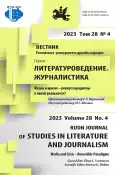Historical figures in “Fate/Grand Order”: adapting Anastasia Romanova
- Authors: Yosugandi E.M.1, Kaprisma H.1
-
Affiliations:
- Universitas Indonesia
- Issue: Vol 28, No 4 (2023): Media and Crisis – Reversible Paradigms
- Pages: 712-723
- Section: LITERARY CRITICISM
- URL: https://journal-vniispk.ru/2312-9220/article/view/319106
- DOI: https://doi.org/10.22363/2312-9220-2023-28-4-712-723
- EDN: https://elibrary.ru/FYNMJU
- ID: 319106
Cite item
Full Text
Abstract
Historical events and figures tend to escape people’s memory as time goes by. In some cases, they are replaced by popular culture adaptations, e.g., video games, fiction, films, etc. Such adaptations may be beneficial to historical memory, preserving their historical models for posterity. Sometimes, adaptation become part of fictional history. “Fate/Grand Order” is a game released by Type-Moon in 2015 (Japan). Its fictional universe makes an active use of various characters of folklore and history, e.g., Joan of Arc, King Arthur, etc. The aim of the study is to examine the adaptation of Anastasia Romanova in the game “Fate/Grand Order”. The adaptation analysis scheme proposed by Linda Hutcheon, as well as the comparative method to cross-reference dialogs, illustrations, skills, craft essence in the game with photographs and biography of the real Anastasia Romanova were used. It is proved that Anastasia the Duchess of the Permafrost Empire from “Fate/Grand Order” is indeed an adaptation of the real Anastasia Romanova, the fourth daughter of the last Russian Emperor Nicolas II, although somewhat modified to match the traditional imagery of the Japanese popular culture.
About the authors
Evan Marchel Yosugandi
Universitas Indonesia
Author for correspondence.
Email: evan.marchel@ui.ac.id
fourth-year student, Faculty of Humanities Depok, 16424, Republic of Indonesia
Hendra Kaprisma
Universitas Indonesia
Email: kaprisma@ui.ac.id
ORCID iD: 0000-0001-6569-2245
Doctor of Literature Studies, Faculty of Humanities
Depok, 16424, Republic of IndonesiaReferences
- Brewster, H. (1999). Anastasia’s album: The last Tsar’s youngest daughter. Little, Brown and Company.
- Cao, S. (2016). The variation theory of comparative literature. Springer.
- Chapman, A. (2016). Digital games as history: How videogames represent the past and offer access to historical practice. Routledge.
- Hutcheon, L. (2006). A theory of adaptation. Routledge.
- Lincoln, W. (1981). The Romanovs: Autocrats of all the Russians. Dial press, Penguin Random House.
- Rappaport, H. (2018). The race to save the Romanovs: The truth behind the secret plans to rescue Russia’s imperial family. Random House.
- Riasanovsky, N.V., & Steinberg, M.D. (2000). A history of Russia. Oxford University Press.
- Romanova, A.N. (2017). The first selfie: The autobiography of Grand Duchess Anastasia of Russia. Createspace Independent Publishing Platform.
- Vorres, I. (2001). The last Grand Duchess: Her Imperial Highness Grand Duchess Olga Alexandrovna, 1 June 1882 - 24 November 1960. Toronto: Key Porter Books.
Supplementary files









